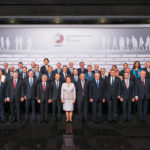[“European Magnifying Glass: This Week In Focus“ is a partnership between The New Federalist, our sister publication Le Taurillon, and three Paris-based webzines, Eurosorbonne, Voix d’Europe and Courrier d’Europe. Each month, we choose a different focus, and each of the partners produces an article to zoom in on a different aspect of the topic. For this first edition, we have selected the Munich Security Conference. The following article is The New Federalist’s contribution on the theme “Westlessness”. ]
Nothing reflects the issue of “Westlessness” more than the West’s collective inability to agree on what it is.
Despite the at best muddy meaning of the concept, “Westlessness” was the theme of this year’s Munich Security Conference, an annual get-together for world leaders to discuss international security policy. This year’s chosen theme is both an acknowledgement of the West’s feeling of lost control and a Western-centric plea to restore it. Yet there was an even bigger elephant in the room than the disagreement over what the conference was really about; a discrepancy in understanding of what we mean by “the West” in 2020.
Who said what in the Bavarian capital?
The harmony of Western representatives’ discourse was something akin to that of a choir which turns up to perform without knowing in which key it is supposed to be singing. US Secretary of State Mike Pompeo was the most out of tune, presenting a rather over-optimistic assertion that “the West is winning”. Shortly after, US Defence Secretary Mark T. Esper exposed the fear and mistrust with which the US regards China, sentiments glossed over by his compatriot minutes earlier.
NATO Secretary General Jens Stoltenberg assured everybody within earshot that the US and Europe are “partners, two sides of the same coin”, as if oblivious to the gaping chasms which have opened up between them. In contrast, French President Emmanuel Macron presented his vision for a more solitary leadership in world affairs for Europe, more independent of the US. Germany, anxious that Macron is too apt to overestimate his continent’s power and influence, dislikes his readiness to depart from the US-led NATO status quo and take security into his own hands.
Underneath this cacophony of discord ran a strong shared undercurrent of insecurity. This stems from the fact that the world is no longer looking west, but east – not least to China.
The tech giant from the East
Though the US still asserts itself as the world’s greatest military power, China’s defence spending has jumped massively in recent years. Equally, the extremely strong growth in China’s economy, while still ranked second-largest, has made it the world’s biggest trading nation, leaving the economic plight of the West deeply intertwined with that of China. The East Asian country has also gained influence in other ways. Through pouring money into tech giants latched on the state, China has produced Huawei, as yet completely unrivalled in its 5G network-building capacities.
Huawei is knocking on many Western doors at the very moment that the inhabitants are looking to upgrade their telecommunications; the only snag being that many don’t feel safe giving China the key. Britain has made itself even more unpopular with Europe (if that were even possible) and has drawn strongly disapproving looks from the US for declaring that it will allow Huawei access to its networks. Across the Atlantic, a firmly slammed door in response to Huawei’s demands appears to be the only thing Democrats and Republicans can agree on. US Speaker of the House Nancy Pelosi accused China of trying to “export its digital autocracy” and emphasised how careful we should be when treading around the fresh powers that technology represents.
Being overtaken in communication technology has not calmed any jittery Western nerves. But it also shows the West requires an urgent update in how it plans and coordinates its security policy. The US can continue to invest in the military and harass other NATO members to do the same until the cows come home. It has been slow to recognise that a technological revolution has made other types of power far more imminently pertinent.
Defence, cash, tech or values?
The idea of “Westlessness” is vague enough to encompass all the above challenges. But more than the threat to its world leader status, whether in economic or other terms, it is the values around which the West used to be able to unite which are adrift. The election of Donald Trump has caused trust in the hegemon of the 20th century to tumble away, fuelling doubt as to whether the US is capable of leading the world into anything but trouble. Brexit has greatly weakened the external credibility of the European clan in terms of influence and economic might. Bubbles of populism in many European countries are beginning to inhibit even reasonably securely elected mainstream governments’ ability to enact certain policies for fear of reprisal from the far right. Additionally, the West’s military power is not so much constrained by its reluctance to fund it but by the lack of political consensus around using it.
Moreover, rising awareness of rising inequality, particularly in the wake of the 2008 financial crisis, coupled with the climate emergency, have led the public to challenge, on an unprecedented scale, how well our democracies and economic model really serve our interests.
The West used to be able to agree on liberal democracies and free markets. At a time when both external and internal factors are conspiring to challenge past narratives of Western dominance, it’s no wonder the cohesion of the Western team is being tested now that these two fundamental pillars are crumbling. Suddenly, what the West was all about in the first place doesn’t seem quite so clear.
by Madelaine Pitt.




